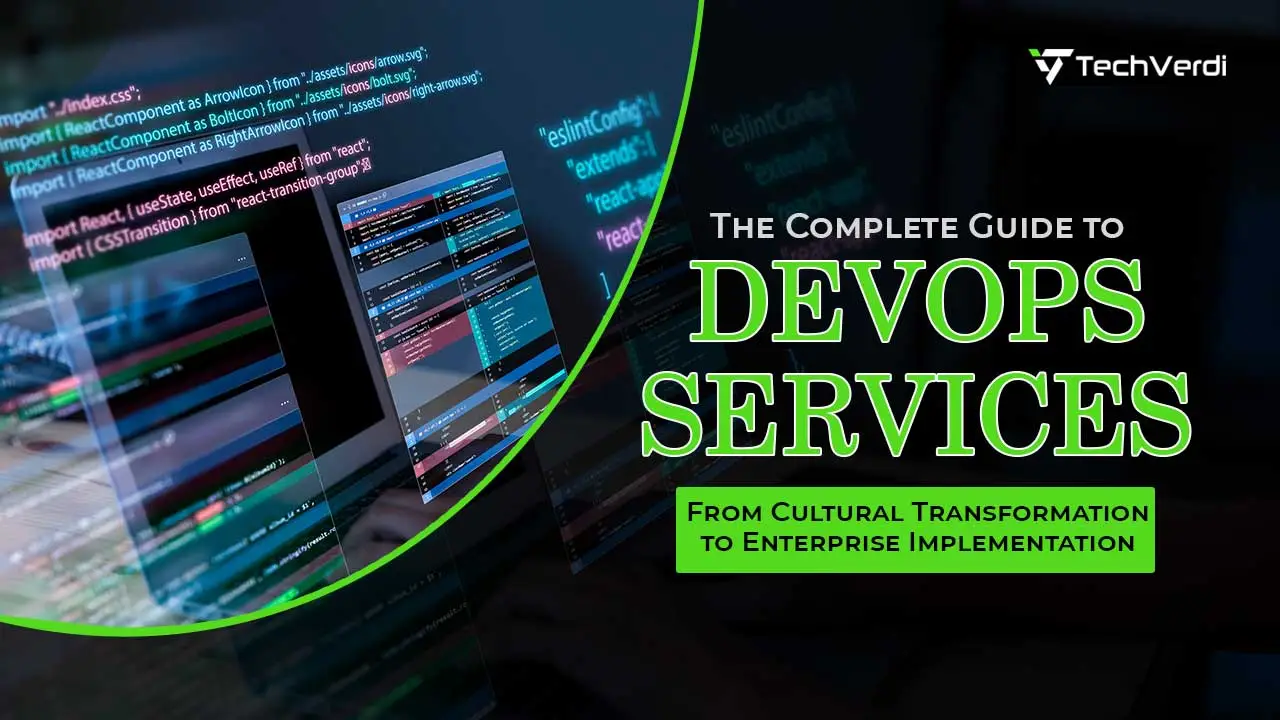
The digital transformation landscape has fundamentally shifted how organizations develop, deploy, and maintain software applications. DevOps services have emerged as the cornerstone of modern software development, bridging the traditional gap between development and operations teams to deliver applications at unprecedented speed and reliability.
Whether you’re a startup looking to scale rapidly or an enterprise seeking to modernize legacy systems, understanding DevOps services and their implementation is crucial for staying competitive in today’s fast-paced market. This comprehensive guide explores everything from foundational concepts to advanced enterprise implementation strategies.
What are DevOps services and why do they matter?
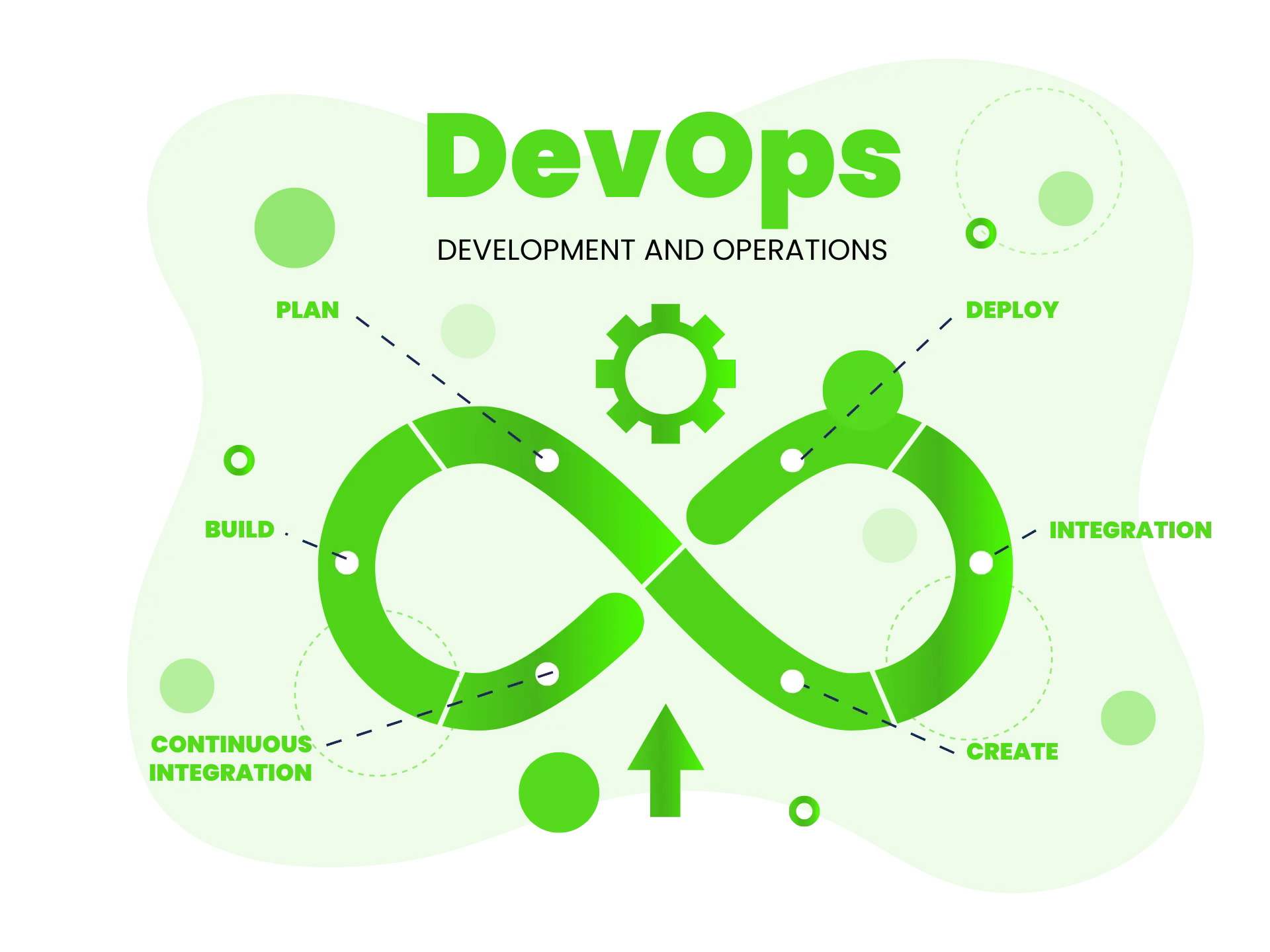
DevOps services encompass a comprehensive suite of practices, tools, and cultural philosophies designed to increase an organization’s ability to deliver applications and services at high velocity. Unlike traditional software development approaches, DevOps services focus on breaking down silos between development and operations teams, creating a unified workflow that emphasizes collaboration, automation, and continuous improvement.
The core principle behind DevOps consulting services lies in the cultural transformation that removes barriers between traditionally separate teams. This shift enables organizations to evolve and improve products faster than those using conventional software development and infrastructure management processes, ultimately allowing them to serve customers better and compete more effectively in the market.
The Business Impact of DevOps Services
Modern organizations leveraging DevOps development services report significant improvements across multiple metrics:
- Deployment frequency increases by 200-300%.
- Lead time for changes reduces by 50-75%.
- Mean time to recovery improves by 60-90%.
- Change failure rates decrease by 40-60%.
These improvements translate directly into competitive advantages, enabling businesses to respond quickly to market demands, reduce operational costs, and enhance customer satisfaction through more reliable software delivery.
Looking to develop an innovative mobile app for your business?
Top 10 Cash Advance Apps in 2025
1. Continuous Integration and Continuous Delivery (CI/CD)
At the heart of any DevOps service provider's offering lies CI/CD implementation. Continuous Integration involves automatically building and testing code changes as developers commit them to version control systems. This practice enables teams to detect integration issues early, reducing the cost and complexity of bug fixes.
Continuous Delivery extends this concept by ensuring that code changes are automatically prepared for release to production environments. When implemented effectively, CD ensures that every code commit results in a deployment-ready build that has passed standardized testing procedures.
Benefits of CI/CD Services:
MoneyLion generally provides immediate help for emergencies but has a wider purpose of financial wellness that’s much conducive to keeping the bank long term. This app is well known by those who wish for more than just cash advances, through its memberships which offer further benefits such as free credit score monitoring and financial coaching to avoid future financial downfalls.
- Reduced manual errors through automation.
- Faster time-to-market for new features.
- Improved code quality through automated testing.
- Enhanced collaboration between development teams.
- Consistent deployment processes across environments.
2. Infrastructure as Code (IaC)
Infrastructure as Code represents a paradigm shift in how organizations manage their computing resources. Rather than manually configuring servers and infrastructure components, IaC enables teams to define and manage infrastructure through code, applying the same version control and testing practices used for application development.
This approach offers several key advantages:
- Scalability: Infrastructure can be replicated and scaled programmatically.
- Consistency: Eliminates configuration drift between environments.
- Version Control: Infrastructure changes are tracked and reversible.
- Cost Optimization: Resources can be provisioned and deprovisioned automatically.
3. Monitoring and Logging Services
Comprehensive monitoring and logging form the foundation of reliable DevOps operations. These services provide real-time visibility into application performance, infrastructure health, and user experience metrics.
Effective monitoring strategies include:
- Application Performance Monitoring (APM): Tracks application response times, error rates, and resource utilization.
- Infrastructure Monitoring: Monitors server health, network performance, and storage capacity.
- Log Aggregation: Centralizes logs from multiple sources for analysis and troubleshooting.
- Alerting Systems: Proactively notifies teams of potential issues before they impact users.
4. Security Integration (DevSecOps)
Modern DevOps services increasingly incorporate security practices throughout the development lifecycle, creating what's known as DevSecOps. This approach treats security as a shared responsibility rather than a separate concern handled at the end of the development process.
Key DevSecOps practices include:
- Automated security scanning in CI/CD pipelines.
- Container image vulnerability assessments.
- Infrastructure security monitoring.
- Compliance automation and reporting.
- Threat detection and response integration.
Connect With TechVedi Today to Get Your Software Integrated and Synchronized.
Types of DevOps Service Providers
In-House DevOps Teams
Many organizations choose to build internal DevOps capabilities, hiring dedicated DevOps engineers and establishing internal practices. This approach offers maximum control and customization but requires significant investment in talent acquisition, training, and tool licensing.
Advantages:
- Direct control over processes and tools.
- Deep understanding of business requirements.
- Long-term knowledge retention.
- Customized solutions for specific needs.
Disadvantages:
- High recruitment and retention costs.
- Extended time to establish mature practices.
- Ongoing training and certification requirements.
- Limited exposure to industry best practices.
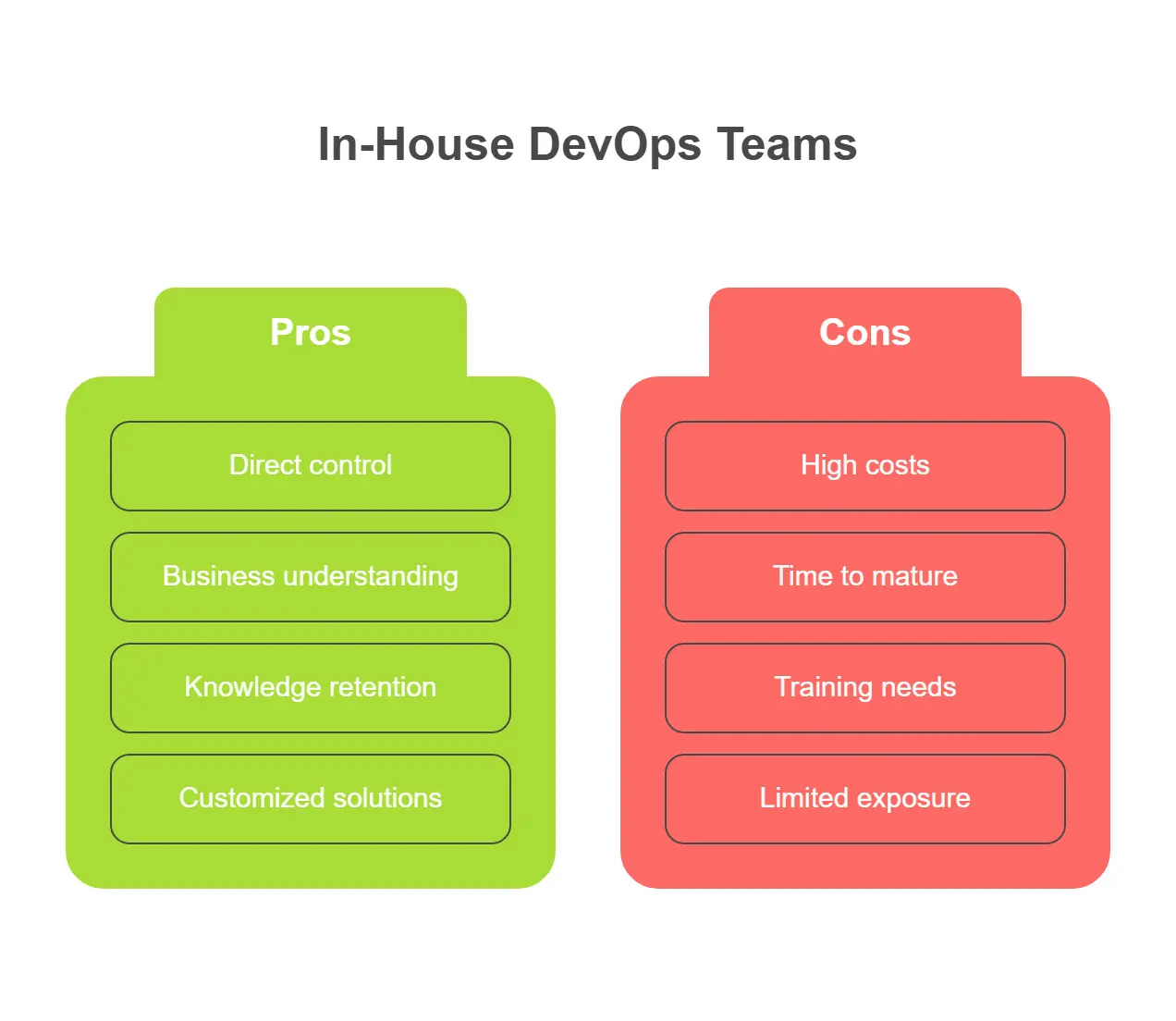
DevOps Consulting Companies
Partnering with a DevOps consulting company provides access to specialized expertise and proven methodologies without the overhead of building internal capabilities. These partnerships are particularly valuable for organizations beginning their DevOps journey or those requiring specific technical expertise.
Benefits of DevOps Consulting Services:
- Accelerated implementation timelines.
- Access to certified professionals.
- Proven methodologies and best practices.
- Reduced risk through experience.
- Cost-effective for short to medium-term projects.
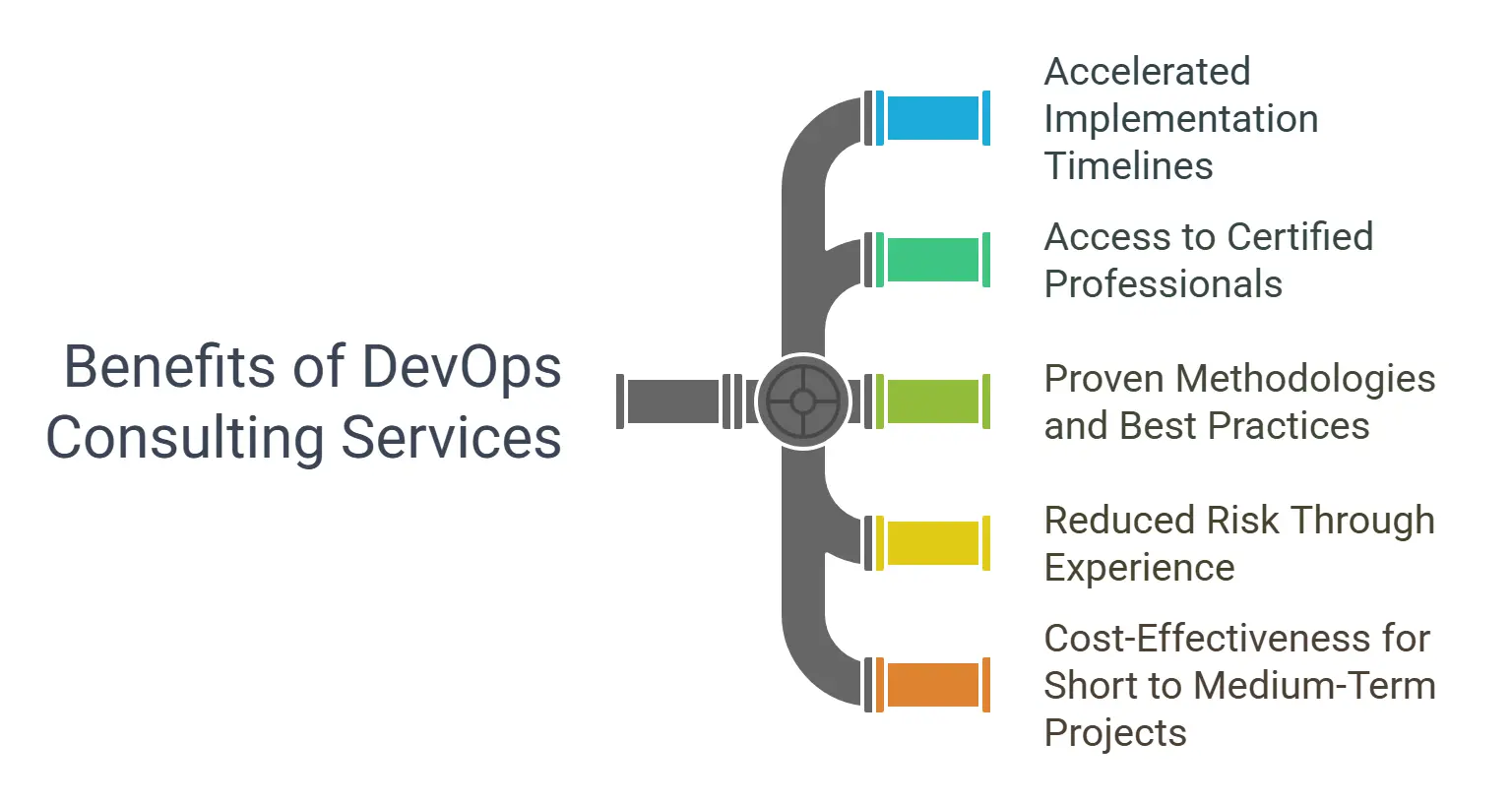
Cloud Provider DevOps Services
Major cloud platforms offer comprehensive DevOps services integrated with their infrastructure offerings. These services provide seamless integration with cloud resources and often include managed services that reduce operational overhead.
Popular Cloud DevOps Platforms:
- AWS DevOps services (CodePipeline, CodeBuild, CodeDeploy).
- Azure DevOps Services (Azure Pipelines, Azure Repos).
- Google Cloud DevOps (Cloud Build, Cloud Deploy).
- Multi-cloud DevOps platforms for hybrid environments.
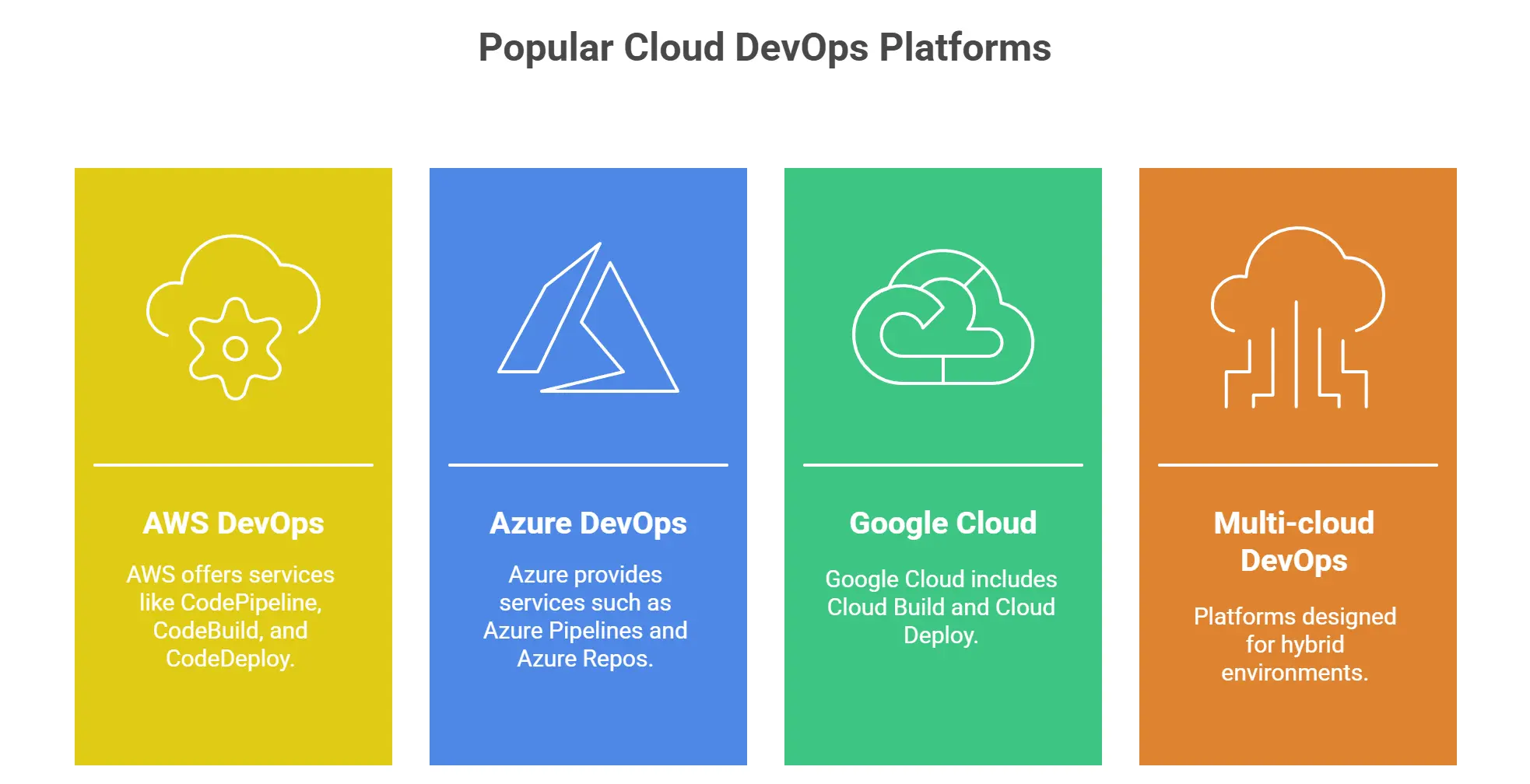
Ensure data security and compliance with custom CRM solutions
Advanced DevOps Services and Emerging Trends
Machine Learning Operations (MLOps)
MLOps represents the convergence of DevOps practices with machine learning workflows. This discipline addresses the unique challenges of deploying, monitoring, and maintaining ML models in production environments.
Key MLOps capabilities include:
- Automated model training and validation pipelines.
- Model versioning and rollback capabilities.
- A/B testing frameworks for model performance.
- Automated model monitoring and drift detection.
- Compliance and governance for ML workflows.
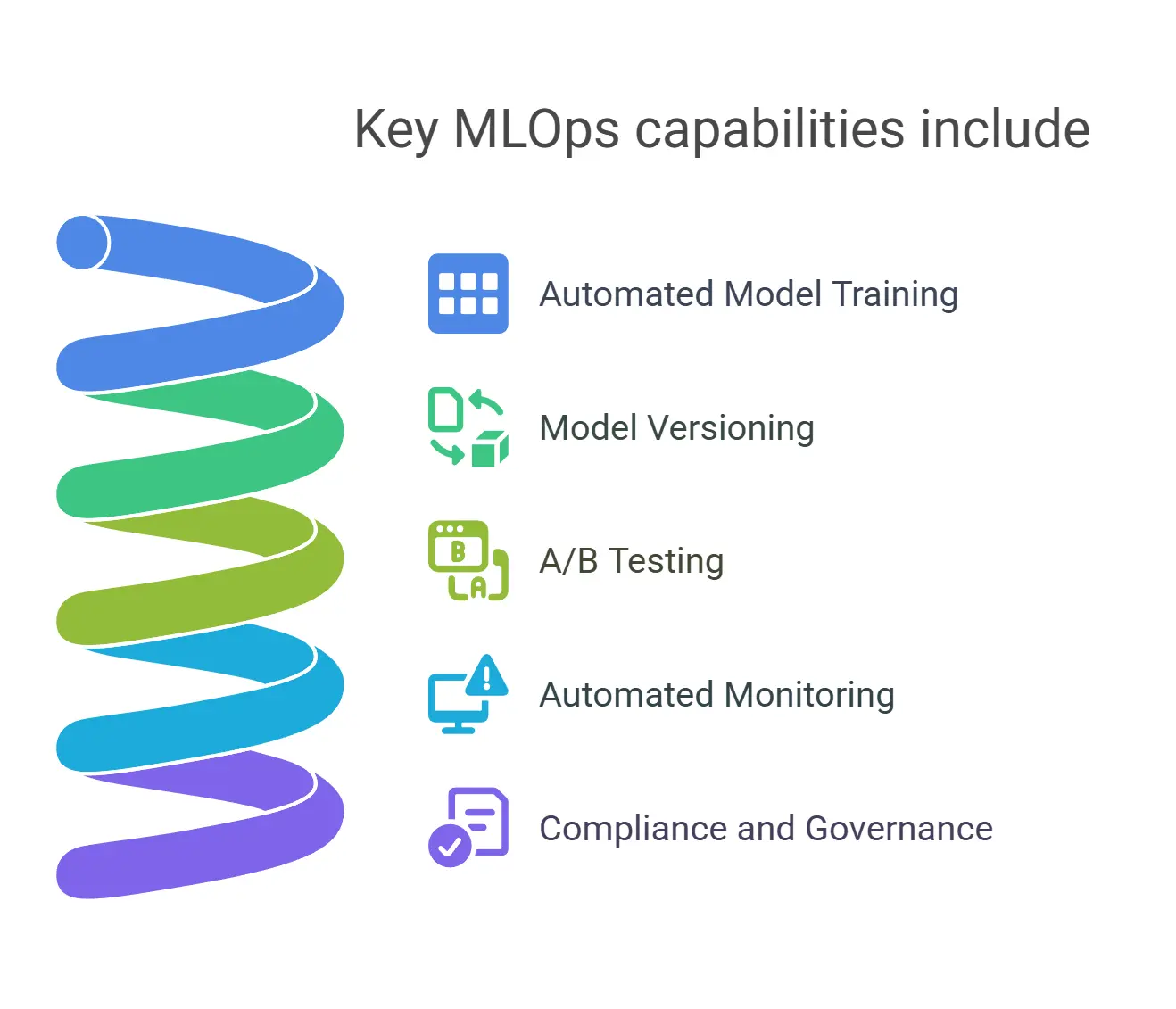
GitOps Implementation
GitOps extends DevOps principles by using Git repositories as the single source of truth for infrastructure and application configurations. This approach leverages Git’s built-in capabilities for version control, collaboration, and audit trails.
GitOps Benefits:
- Declarative infrastructure management.
- Enhanced security through Git-based access controls.
- Simplified rollback and recovery procedures.
- Improved collaboration through pull request workflows.
- Automated synchronization between desired and actual states.
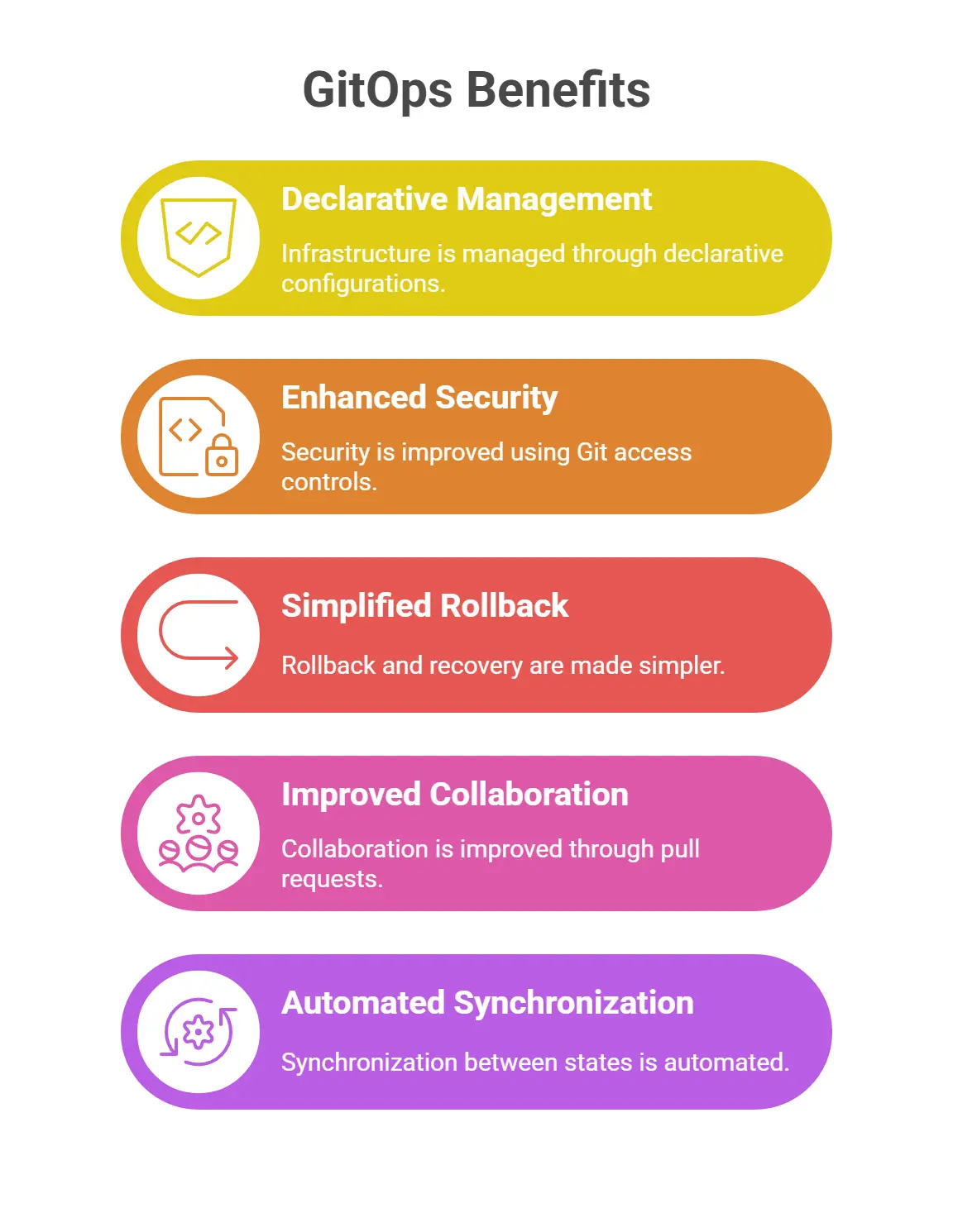
Serverless DevOps
The rise of serverless computing has created new opportunities and challenges for DevOps teams. Serverless DevOps focuses on optimizing workflows for function-based architectures and event-driven applications.
Serverless DevOps Considerations:
- Function deployment and versioning strategies.
Cold start optimization techniques. - Event-driven monitoring and logging.
- Cost optimization for function-based architectures.
- Multi-cloud serverless orchestration.
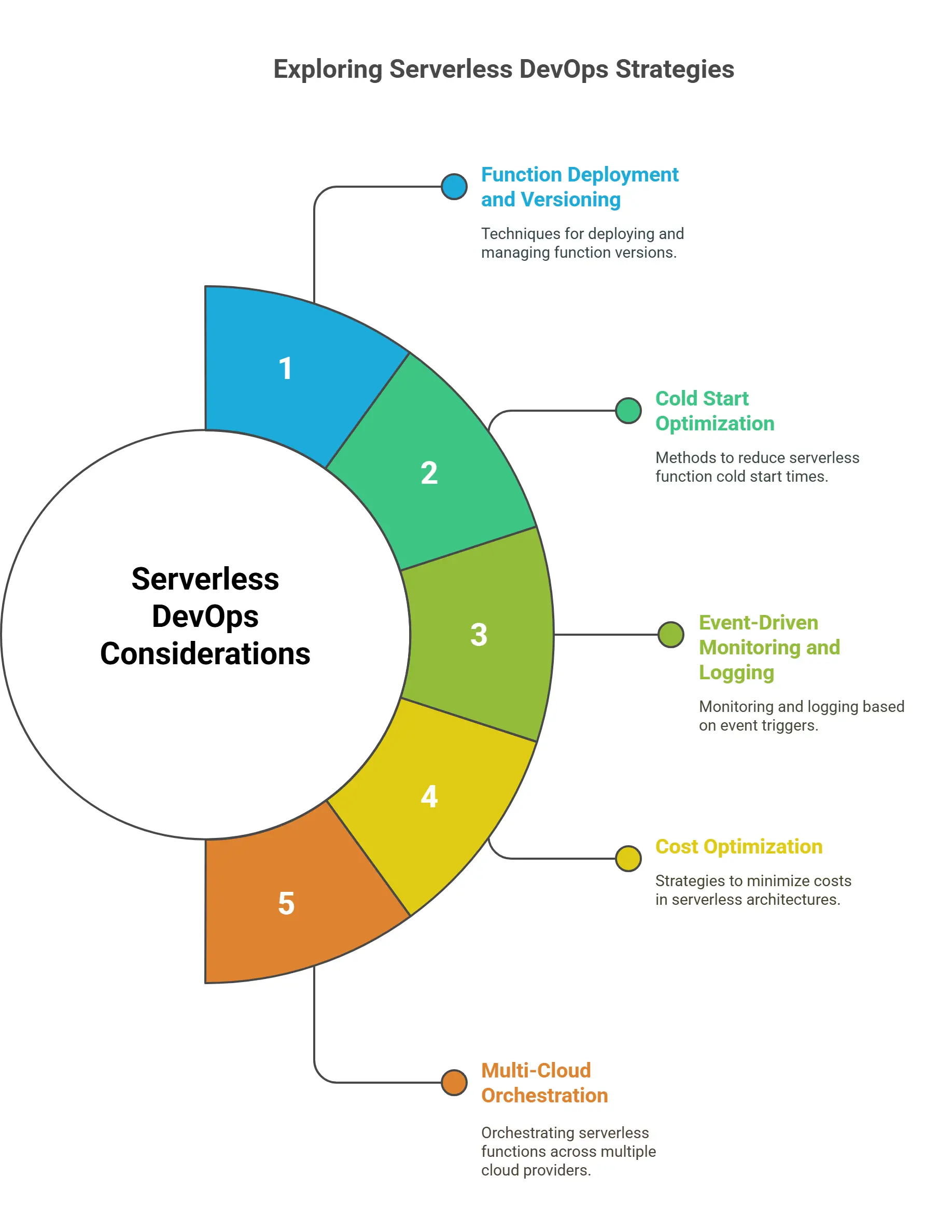
Which Option Best Suits You?
If you are confused, we can help you right away. Reach out to our experts.
Choosing the Right DevOps Support Services
Assessing Your Organization's Maturity
Before selecting DevOps support services, organizations must honestly assess their current maturity level across several dimensions:
Technical Maturity:
- Current automation levels.
- Existing tool chains and integrations.
- Infrastructure complexity.
- Application architecture patterns.
Cultural Maturity:
- Cross-team collaboration practices.
- Change management processes.
- Risk tolerance for new technologies.
- Learning and development culture.
Organizational Maturity:
- Leadership support for DevOps initiatives.
- Resource allocation capabilities.
- Change management processes.
- Performance measurement systems.
Evaluation Criteria for DevOps Service Providers
When evaluating potential DevOps consulting services, consider these critical factors:
Technical Expertise:
- Certifications and credentials.
- Experience with your technology stack.
- Track record with similar organizations.
- Innovation and thought leadership.
Service Offerings:
- Breadth of service capabilities.
- Customization and flexibility.
- Integration with existing systems.
- Support and maintenance options.
Business Alignment:
- Understanding of your industry.
- Cultural fit with your organization.
- Communication and collaboration practices.
- Success metrics and reporting capabilities.
Looking to develop an innovative mobile app for your business?
Implementation Strategies for Enterprise DevOps
Phased Approach to DevOps Transformation
Successful enterprise DevOps implementations typically follow a phased approach that allows organizations to build capabilities incrementally while demonstrating value at each stage.
Phase 1: Foundation Building (Months 1-3)
- Establish basic CI/CD pipelines.
- Implement infrastructure as code for development environments.
- Introduce automated testing practices.
- Begin cultural change initiatives.
Phase 2: Scaling and Optimization (Months 4-9)
- Extend CI/CD to production environments.
- Implement comprehensive monitoring and logging.
- Introduce security automation (DevSecOps).
- Expand training and knowledge sharing.
Phase 3: Advanced Practices (Months 10-18)
- Implement advanced deployment strategies (blue/green, canary).
- Introducing chaos engineering practices.
- Optimize for performance and cost.
- Establish a center of excellence.
Phase 4: Innovation and Optimization (Ongoing)
- Explore emerging technologies (MLOps, AIOps).
- Continuous improvement processes.
- Knowledge sharing with the industry community.
- Advanced analytics and insights.
Measuring DevOps Success
Effective DevOps programs require comprehensive measurement strategies that track both technical and business metrics:
Technical Metrics:
- Deployment frequency.
- Lead time for changes.
- Mean time to recovery (MTTR).
- Change failure rate.
- System availability and reliability.
Business Metrics:
- Customer satisfaction scores.
- Revenue per deployment.
- Market time-to-value.
- Employee satisfaction and retention.
- Operational cost reduction.
Unlock Growth with TechVerdi’s Solutions
Common Challenges and Solutions
Cultural Resistance
Organizations often encounter resistance when implementing DevOps practices, particularly from teams comfortable with existing processes.
Solutions:
- Executive sponsorship and visible support.
- Gradual introduction of changes.
- Training and skill development programs.
- Success story sharing and recognition.
- Clear communication of benefits and expectations.
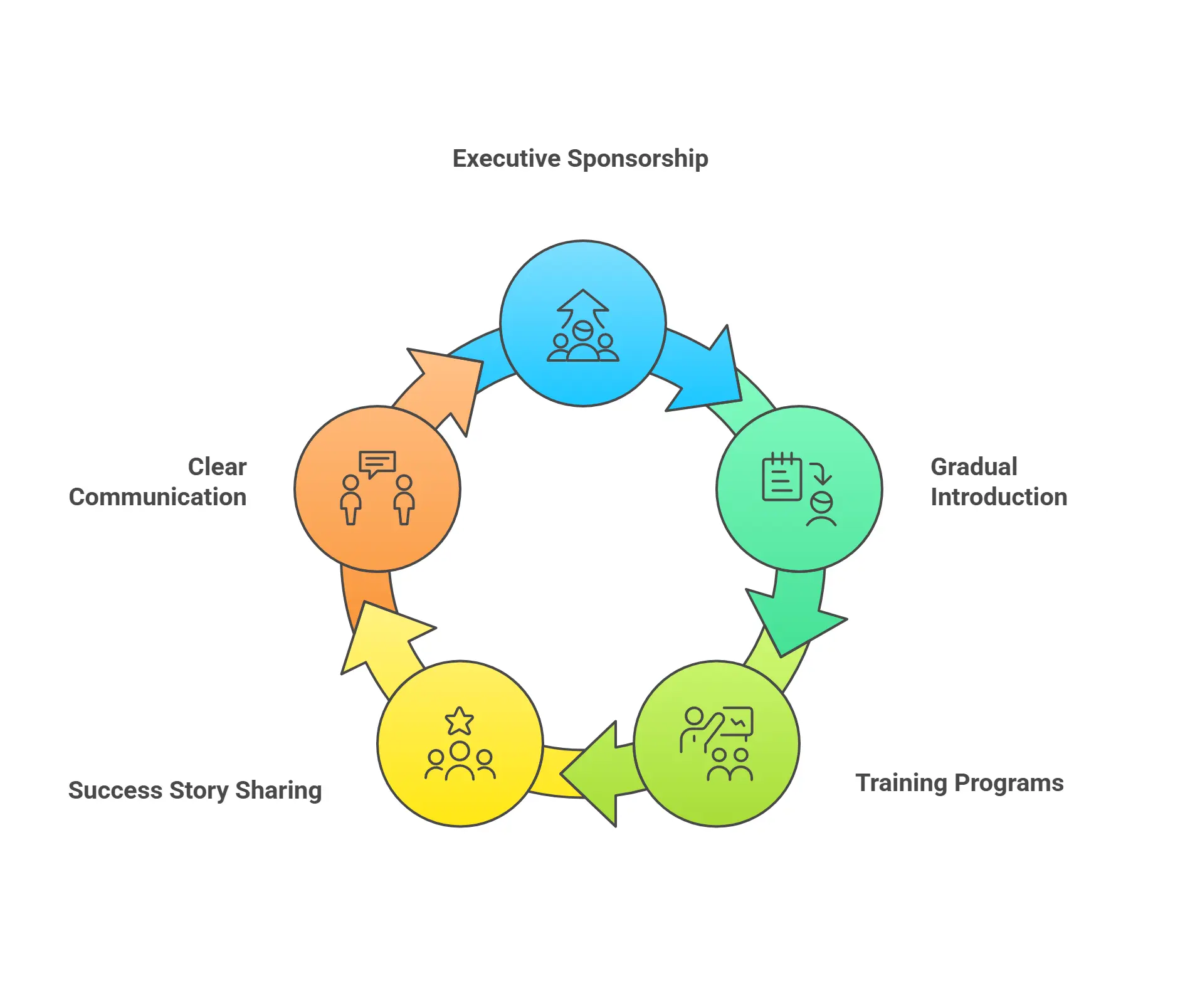
Tool Integration Complexity
The DevOps ecosystem includes hundreds of tools, and integration complexity can quickly overwhelm teams.
Solutions:
- Start with core tools and expand gradually.
- Prioritize tools with strong integration capabilities.
- Invest in platform solutions that reduce integration overhead.
- Establish tool evaluation and selection processes.
- Consider managed services to reduce operational complexity.
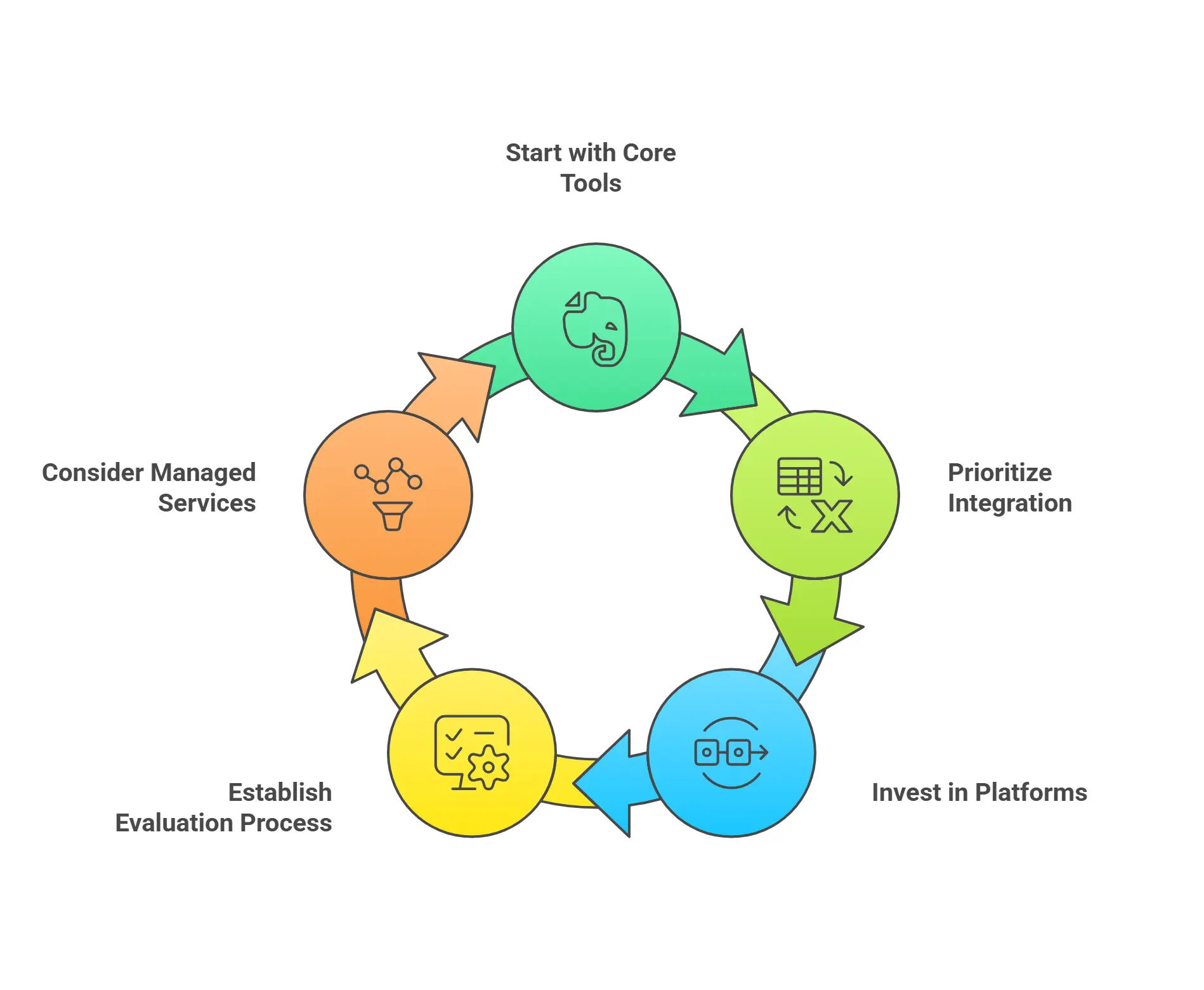
Skill Gaps and Training
DevOps requires new skills that may not exist within traditional development and operations teams.
Solutions:
- Comprehensive training programs.
- Mentorship and knowledge sharing initiatives.
- External training and certification programs.
- Hiring strategies that balance internal development with external expertise.
- Community participation and industry engagement.
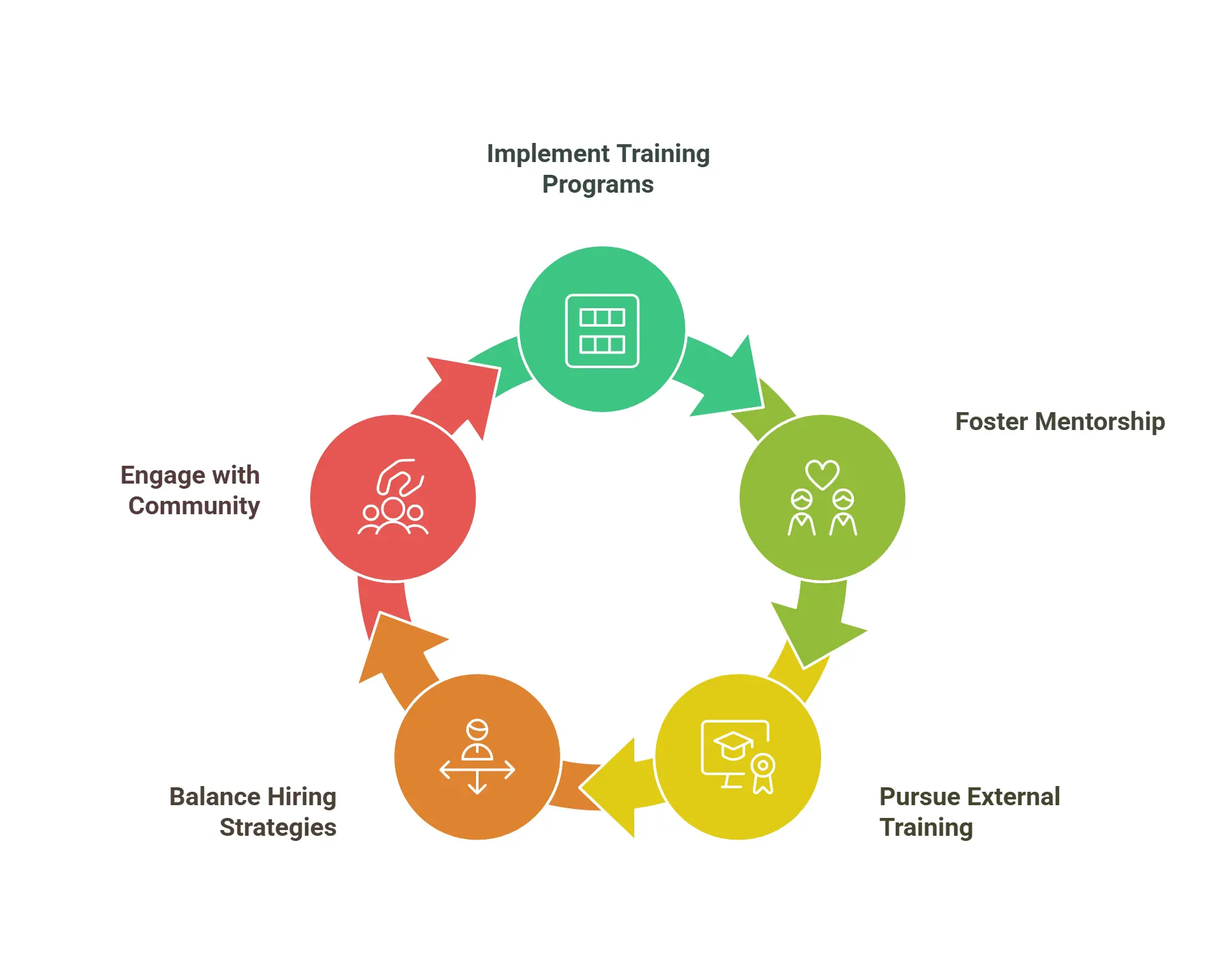
Want to Create Swiss App?
Future of DevOps Services
Artificial Intelligence and Automation
The integration of AI and machine learning into DevOps practices promises to further accelerate development cycles and improve operational efficiency. AIOps platforms are beginning to provide predictive insights, automated issue resolution, and intelligent resource optimization.
Emerging AI-Driven Capabilities:
- Predictive failure analysis.
- Automated root cause analysis.
- Intelligent resource scaling.
- Security threat detection and response.
- Code quality optimization.
Platform Engineering
Platform engineering represents an evolution of DevOps practices, focusing on creating internal platforms that provide self-service capabilities for development teams. This approach aims to reduce cognitive load on developers while maintaining the benefits of DevOps practices.
Platform Engineering Benefits:
- Reduced complexity for development teams.
- Standardized development workflows.
- Improved developer productivity.
- Enhanced security and compliance.
- Scalable self-service capabilities.
Conclusion
DevOps services represent far more than a set of tools or practices—they embody a fundamental shift in how organizations approach software development and operations. From cultural transformation to technical implementation, successful DevOps initiatives require careful planning, skilled execution, and ongoing commitment to continuous improvement.
Whether you choose to build internal capabilities, partner with DevOps consulting companies, or leverage cloud provider services, the key to success lies in understanding your organization’s unique needs and maturity level. By taking a strategic approach to DevOps implementation and focusing on both technical excellence and cultural transformation, organizations can achieve the speed, reliability, and innovation necessary to thrive in today’s competitive landscape.
The future of DevOps continues to evolve with emerging technologies like AI, serverless computing, and platform engineering. Organizations that embrace these changes while maintaining focus on fundamental DevOps principles will be best positioned to capitalize on new opportunities and deliver exceptional value to their customers.
DevOps Services FAQs
DevOps combines development and operations to deliver software faster and more reliably. Key advantages include 200% faster deployments, 60% reduced downtime, and improved team collaboration.
DevOps consulting services cost $150-$300 per hour, while managed services range from $5,000-$50,000 monthly. ROI typically achieved within 6-12 months through efficiency gains.
DevOps consulting offers faster implementation (3-6 months) with proven expertise, while in-house engineers provide long-term knowledge retention and full process control.
Basic CI/CD setup takes 2-4 weeks, departmental implementation requires 3-6 months, and enterprise-wide transformation needs 12-24 months for complete adoption.
Essential tools include Jenkins/GitLab CI for CI/CD, Docker/Kubernetes for containers, Terraform for infrastructure as code, and Prometheus/Grafana for monitoring.
Yes, small businesses gain faster feature delivery, reduced operational costs, improved reliability, and competitive advantages through cloud-based DevOps services.
DevOps focuses on development-operations collaboration, DevSecOps integrates security throughout pipelines, and MLOps applies DevOps principles to machine learning workflows.
Key metrics include deployment frequency, lead time for changes, change failure rate, mean time to recovery, and customer satisfaction scores.
Main challenges are cultural resistance to change, legacy system complexity, skill gaps in automation, and lack of executive support.
Cloud-based DevOps tools are recommended for most organizations due to lower costs, automatic updates, and scalability. On-premises suits highly regulated industries.
